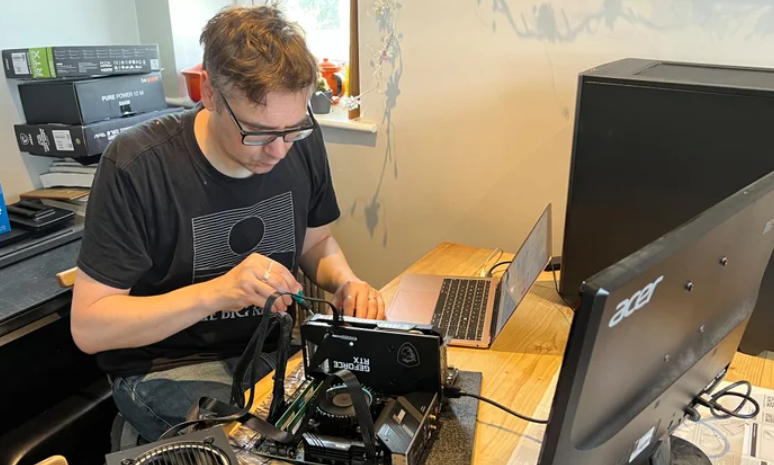Which Components Are Essential in a Best Budget Gaming PC?

Gaming in 2025 has become more accessible, with high-quality experiences no longer limited to ultra-expensive rigs. For gamers on a budget, a best budget gaming PC can provide impressive performance without breaking the bank. However, creating a system that balances cost, performance, and longevity requires careful component selection. Additionally, pairing your PC with the right Gaming Peripherals can drastically enhance your experience. In this guide, we’ll explore the essential components you need in a best budget gaming PC, helping you build or buy a setup that delivers maximum value.
1. CPU: The Heart of Your Gaming PC
The CPU, or central processing unit, is the brain of your best budget gaming PC. It handles game logic, physics, and multitasking, making it critical for smooth performance.
- Budget-Friendly Options: AMD Ryzen 5 5600G or Intel Core i3/i5 13th Gen.
- Performance Considerations: Look for CPUs with multiple cores and threads for multitasking and modern gaming.
- Integrated Graphics: Some CPUs, like AMD Ryzen 5 G-series, include integrated graphics, which can help save money if you’re building a PC without a discrete GPU initially.
A strong CPU ensures your system doesn’t bottleneck the GPU, maintaining smooth gameplay in demanding titles.
2. GPU: The Core of Gaming Performance
For gaming, the GPU is arguably the most critical component. A best budget gaming PC doesn’t need the latest RTX card but should deliver decent performance for modern games.
- Affordable GPUs: Nvidia GTX 1660, RTX 3050, or AMD Radeon RX 6600.
- Performance Targets: 1080p gaming at medium to high settings is achievable with these cards.
- Future-Proofing: While high-end GPUs are costly, budget options today can still handle upcoming titles if chosen carefully.
The GPU, paired with a capable CPU, ensures that your best budget gaming PC can run games smoothly without stuttering or lag.
3. RAM: Ensuring Smooth Multitasking
Random Access Memory (RAM) is essential for smooth gameplay and multitasking. Insufficient RAM can lead to stuttering or slow system performance.
- Recommended Amount: 16GB is the sweet spot for a best budget gaming PC in 2025.
- Speed Considerations: 3000–3600MHz RAM modules provide good performance, particularly with AMD CPUs.
- Upgrade Potential: Ensure your motherboard supports future RAM upgrades if you want to extend your PC’s lifespan.
Proper RAM allocation allows your system to handle both gaming and background applications like streaming software.
4. Storage: Speed and Capacity
Fast and reliable storage is crucial in a best budget gaming PC, affecting load times and overall system responsiveness.
- SSD vs HDD: A solid-state drive (SSD) is highly recommended for faster boot times and game loading. Budget builds can include a 500GB–1TB SSD paired with a larger HDD for mass storage.
- NVMe SSDs: These offer even faster read/write speeds than traditional SATA SSDs and are becoming more affordable.
- Game Storage: AAA titles can exceed 100GB, so plan storage capacity accordingly.
A combination of speed and capacity ensures your best budget gaming PC is both responsive and practical for modern gaming.
See also: Mastering the Art of Customer Acquisition 3491870598
5. Motherboard: The Foundation
The motherboard connects all components and supports upgrades. Choosing the right motherboard ensures stability and future expandability for your best budget gaming PC.
- Chipset Considerations: B550 (AMD) or B660 (Intel) chipsets are excellent budget options.
- Compatibility: Ensure the motherboard supports your CPU, RAM speed, and desired GPU.
- Expansion Slots: Check for PCIe slots for future GPU upgrades, additional RAM slots, and storage options.
A solid motherboard ensures your system remains upgrade-friendly, extending the lifespan of your best budget gaming PC.
6. Power Supply Unit (PSU): Reliable Energy Delivery
A stable power supply is essential to prevent crashes and hardware damage.
- Wattage: A 500W–650W PSU is generally sufficient for most budget builds.
- Efficiency: Look for 80 Plus Bronze certification or higher for better efficiency and reliability.
- Quality: Avoid cheap, unbranded PSUs that can damage components.
A reliable PSU ensures that your best budget gaming PC runs safely under heavy loads and supports future upgrades.
7. Case and Cooling: Protecting Your Investment
The case and cooling system are often overlooked but vital components of a best budget gaming PC.
- Case Considerations: Choose a case with good airflow, cable management options, and space for future upgrades.
- Cooling: Stock CPU coolers often suffice, but budget-friendly aftermarket coolers can improve performance and reduce noise.
- Fans: Proper case ventilation prevents overheating during long gaming sessions.
A well-cooled system protects your investment and ensures consistent performance over time.
8. Gaming Peripherals: Completing the Setup
Even the most powerful best budget gaming PC is incomplete without quality Gaming Peripherals. Key peripherals include:
- Monitor: Aim for a 1080p monitor with at least a 75Hz refresh rate; 144Hz is ideal for competitive gaming.
- Keyboard: Mechanical keyboards offer better responsiveness and durability.
- Mouse: A gaming mouse with adjustable DPI ensures precision in fast-paced games.
- Headset: Clear audio and a good microphone improve immersion and communication in multiplayer games.
Investing in quality Gaming Peripherals ensures that your budget build doesn’t feel limiting, providing an enjoyable gaming experience.
9. Optional Components for Extra Value
Depending on your budget, you can consider additional components:
- RGB Lighting: Adds aesthetic appeal but doesn’t affect performance.
- Extra Storage: Additional SSDs or HDDs for large game libraries.
- Upgraded Cooling: Liquid cooling for extreme performance, though often unnecessary for budget builds.
These extras can enhance the experience without significantly impacting the overall cost of your best budget gaming PC.
10. Balancing Budget and Performance
Building or buying a best budget gaming PC requires careful balance between cost and performance:
- Allocate most of your budget to the GPU and CPU for maximum gaming performance.
- Prioritize SSD storage over aesthetic upgrades if the budget is tight.
- Ensure Gaming Peripherals complement your setup without exceeding your budget.
Strategically distributing your funds ensures you get the most out of your best budget gaming PC without compromising on performance.
Conclusion
Creating a best budget gaming PC in 2025 is about making smart choices and understanding which components matter most. A capable CPU and GPU are the heart of your system, while RAM, storage, motherboard, PSU, and cooling ensure stability and performance. Quality Gaming Peripherals complete the experience, providing precision, comfort, and immersion.
By focusing on these essential components, you can build or purchase a best budget gaming PC that delivers impressive performance today and remains upgradeable for future gaming needs. With careful planning and smart component selection, even a budget-friendly system can provide an excellent gaming experience without compromise.


